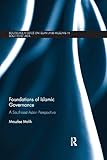Foundations of Islamic Governance A Southeast Asian Perspective
Language: English Publication details: Oxford Routledge 20180814Edition: 1Description: 296 pISBN:- 9781138365971
The aim of this book is to explore and analyze the Islamic axioms, foundation principles and values underpinning the field of governance in an attempt to construct the architectonics of a new systemic and dynamic theory and formulate the articulation of ‘Islamic governance’. This discursive and abstract, rather than being an empirical exercise, assumes to produce a ‘good governance’ framework within its own formulation through a value-shaped dynamic model according to maqasid al-Shari’ah (higher objective of Shari’ah) by going beyond the narrow remit of classical and contemporary discussions produced on the topic, which propose a certain institutional model of governance based on the classical juristic (fiqh) method. Through an exclusive analytical discursive approach in this book, readers will find that Islam as one of the major religions in the contemporary world with the claim of promising the underpinning principles and philosophical foundations of worldly affairs and institutions through a micro method of producing homoIslamicus could contribute towards development of societies by establishing a unique model of governance from its explicit ontological worldview through a directed descriptive epistemology.
There are no comments on this title.
